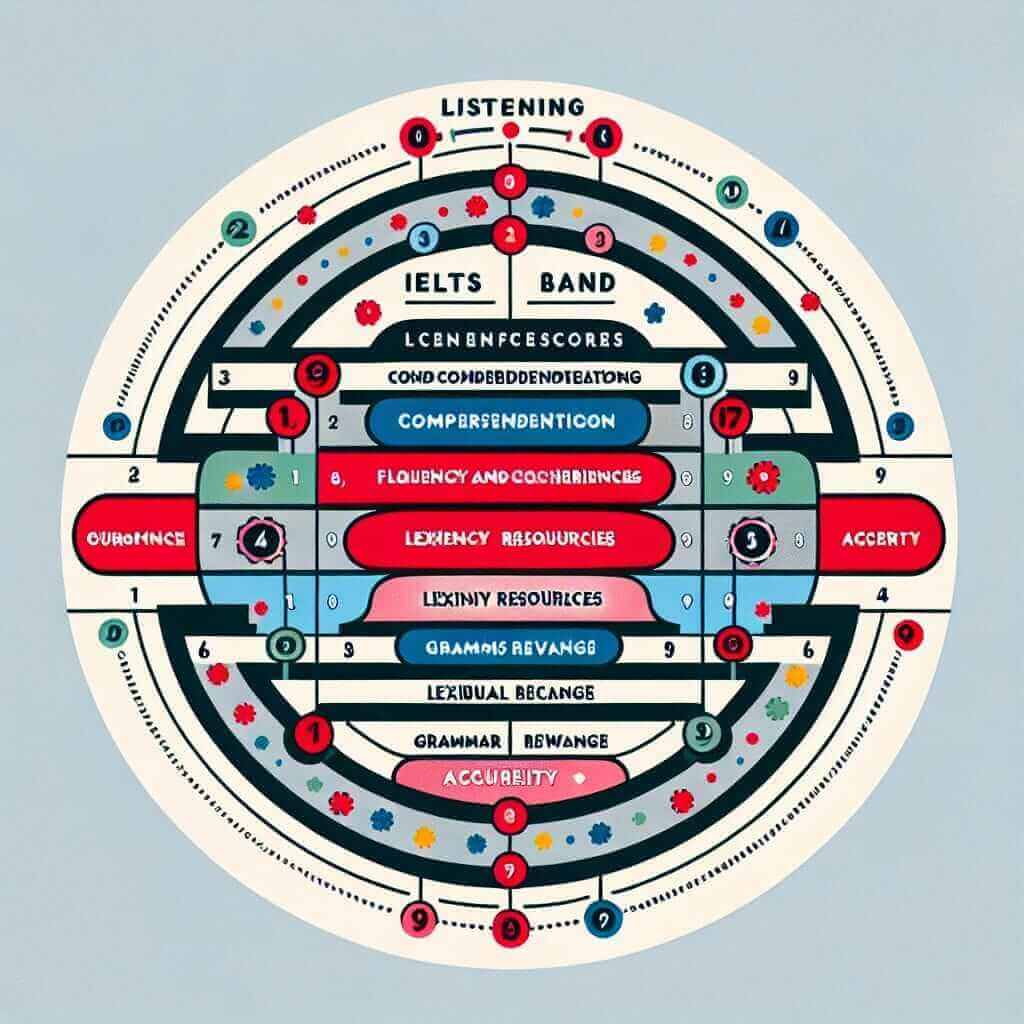The IELTS Listening test can be a challenging hurdle for many test-takers, but understanding the band descriptors can make all the difference in your preparation and performance. These descriptors provide a clear framework for assessing your listening skills and understanding how examiners award scores.
What are IELTS Listening Band Descriptors?
The IELTS Listening band descriptors are a set of criteria that examiners use to evaluate your listening skills in the IELTS test. They cover a range of abilities, from basic comprehension at lower bands to sophisticated understanding and interpretation at higher bands.
Think of these descriptors as a roadmap to your desired band score. They highlight what is expected at each level, allowing you to focus your study efforts and track your progress.
Breaking Down the Band Descriptors
The IELTS Listening band descriptors are divided into four key areas:
1. Comprehension: This focuses on your ability to understand the main ideas, specific information, and the speaker’s purpose.
2. Fluency and Coherence: This assesses how well you can follow the flow of information, understand connections between ideas, and identify different speakers.
3. Lexical Resource: This evaluates your range and accuracy of vocabulary related to the listening topics.
4. Grammatical Range and Accuracy: This assesses your ability to understand and recognize a variety of grammatical structures.
Each area is then scored on a scale of 1-9, with 9 being the highest.
Examples of Performance at Different Band Levels
Band 5:
-
Comprehension: Can understand the main points in simple conversations on familiar topics but struggles with detailed information or unfamiliar vocabulary.
Example: In a conversation about daily routines, a Band 5 listener might understand the times someone wakes up and goes to work but miss details about their exercise habits. -
Fluency and Coherence: May lose track of the conversation when it becomes complex or involves multiple speakers.
Example: In a discussion with three students planning a project, a Band 5 listener might confuse who is responsible for each task. -
Lexical Resource: Uses a limited vocabulary and may make frequent errors that hinder understanding.
Example: Instead of saying “public transportation,” they might use the simpler but less accurate term “bus.” -
Grammatical Range and Accuracy: Uses basic grammatical structures but makes frequent errors, especially in complex sentences.
Example: They might struggle to understand a sentence using the present perfect continuous tense, like “I’ve been studying for my IELTS exam.”
Band 7:
-
Comprehension: Can understand complex and detailed information on a range of familiar and unfamiliar topics.
Example: In a lecture about the history of photography, a Band 7 listener can identify key inventions, understand their impact, and follow the chronological development of the technology. -
Fluency and Coherence: Can follow extended and complex speech with multiple speakers and identify nuances in tone and attitude.
Example: In a radio interview with an author discussing their latest book, a Band 7 listener can distinguish the interviewer’s questions from the author’s opinions and analyze their viewpoints. -
Lexical Resource: Uses a wide range of vocabulary with accuracy and flexibility.
Example: They can differentiate between synonyms like “efficient,” “productive,” and “effective” and use them appropriately in their own responses. -
Grammatical Range and Accuracy: Uses a variety of grammatical structures with accuracy and flexibility.
Example: They can understand and utilize complex grammar forms like conditional clauses (“If I had more time, I would practice my listening skills even more.”)
 IELTS Listening Band Descriptors Chart
IELTS Listening Band Descriptors Chart
Applying Band Descriptors to IELTS Listening Practice
To effectively use the band descriptors, incorporate them into your IELTS Listening practice:
-
Review the Descriptors: Familiarize yourself with the specific requirements for each band level in all four assessment areas.
-
Identify Your Strengths and Weaknesses: Analyze your performance on practice tests to pinpoint areas where you excel and areas needing improvement.
-
Targeted Practice: Focus your study efforts on specific skills and sub-skills outlined in the band descriptors that correspond to your target score. For instance, if you aim for a Band 7, work on understanding a wider range of vocabulary and complex grammatical structures.
-
Practice with Authentic Materials: Utilize IELTS practice materials and authentic listening resources, like podcasts, news broadcasts, and documentaries, to enhance your comprehension and vocabulary.
-
Seek Feedback: Ask an IELTS tutor or a proficient English speaker to evaluate your listening skills and provide feedback based on the band descriptors.
Common Mistakes and How to Avoid Them
-
Focusing only on keywords: While keywords are important, they shouldn’t be your only focus. Pay attention to the context and the relationships between ideas to understand the overall message.
-
Ignoring grammatical cues: Grammatical structures like verb tenses, prepositions, and articles can provide valuable clues about the meaning and relationships between ideas.
-
Neglecting note-taking: Taking effective notes can significantly improve your ability to recall information during the test. Practice different note-taking methods to find what works best for you.
-
Panicking when you miss a word or phrase: Don’t dwell on missed information. Keep listening actively, and you might be able to infer the meaning from the context later.
Conclusion
Understanding and utilizing the IELTS Listening band descriptors is crucial for achieving your desired score. By analyzing these descriptors, identifying your strengths and weaknesses, and adopting effective study strategies, you can enhance your listening skills and approach the IELTS test with confidence. Remember, consistent practice and targeted effort are key to unlocking your full potential in the IELTS Listening section.


